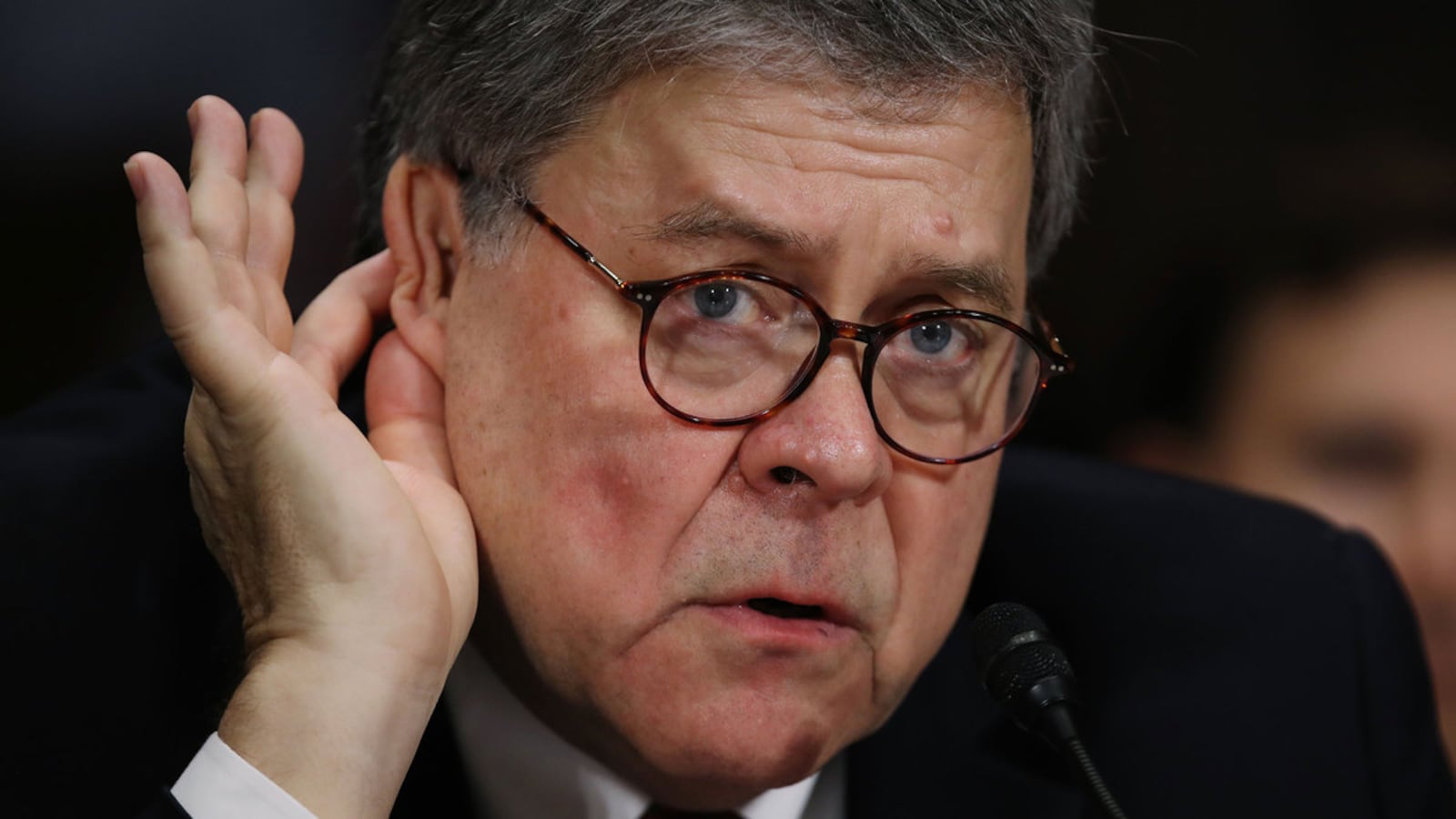Since William Barr became the nation’s attorney general, Justice Department lawyers have regularly bent over backward to come up with legal arguments supporting even Donald Trump’s most outrageous actions, prompting many critics to argue that Barr is really Trump’s personal lawyer, not the nation’s chief law-enforcement officer.
This may be the week that Barr’s balancing act—of simultaneously purporting to enforce the law while defending a president who has contempt for the rule of law—finally collapses. This is because, with a letter “objecting” to the very possibility of his impeachment by Congress, Trump has announced his intention to defy the Constitution itself.
The declaration leaves Barr with a stark choice: Will he employ the Department of Justice to defend a president’s open and notorious violation of the Constitution?
For months, it has become increasingly clear that, under Barr, the DOJ is singularly focused on serving as an apologist for the president, at grave cost to the department’s long-standing role as a law-enforcement agency.
For example, DOJ lawyers defending the inclusion of a citizenship question in the 2020 Census allegedly engaged in a campaign of “delay and obfuscation” that placed them in serious danger of being sanctioned by the court. Furthermore, Trump publicly declared that the DOJ would continue to press the case even after losing in the Supreme Court. Although Barr convinced Trump to give up on that gambit, it presaged the further open defiance of the law that soon followed.
This year, the DOJ joined with Trump’s personal lawyers in a desperate tag-team effort to stonewall each and every effort by Congress and state authorities to review potential evidence of illegal conduct by the president and his associates.
Trump recently challenged enforcement of a New York grand jury subpoena to review Trump’s financial records, including tax returns, held by an accounting firm. Trump’s personal lawyers asserted, with virtually no basis in law, that Trump’s status as president immunizes not only Trump, but also his family members and associates, from any type of criminal investigation for as long as Trump remains in office. The argument was directly contrary to the Supreme Court’s unanimous decision in United States v. Nixon, which compelled compliance with a subpoena for the White House tapes.
Barr’s DOJ made a last-minute effort to intervene in the case, presumably to buttress the president’s frivolous arguments, but did not have the opportunity to make a submission before the judge issued an opinion scathingly rejecting Trump’s argument. The judge, Victor Marrero, stated: “The court cannot endorse such a categorical and limitless assertion of presidential immunity from judicial process as being countenanced by the nation’s constitutional plan.”
Judge Marrero also expressed concern that Trump’s personal lawyers were advancing immunity arguments purportedly “derived from the office of the presidency,” and not Trump’s status as a private citizen, but given the melding of Trump’s personal interests and those of the government he leads that concern now appears almost quaint—as evidenced by recent events in another courtroom.
This past Tuesday, a lawyer from Barr’s DOJ appeared before D.C. federal district court Chief Judge Beryl A. Howell to argue that Congress cannot review grand jury testimony obtained by Robert Mueller’s prosecutors. The DOJ’s argument is directly at odds with another Watergate appellate court precedent that granted Congress access to evidence assembled by prosecutors against Nixon. The DOJ lawyer argued the decision is now invalid due to unspecified subsequent changes in law. Therefore, on the DOJ’s account of current law, Congress would be unable to hear the “smoking gun” tape that forced Nixon from office, and likewise should now be barred from reviewing any further evidence of Trump’s criminality.
The DOJ lawyer also went on to assert that the House’s impeachment inquiry itself is legally defective. The judge likely expected the DOJ attorney to join some Trump partisans in asserting that a vote of the full House is required to render an impeachment investigation legally effective. But the government’s lawyer did not make that argument. Rather, she stated, incredibly, that the DOJ is unwilling to clearly delineate how the House’s investigation can ever be rendered legally legitimate, stating: “We’re not advocating any specific line.”
This response was unsatisfying to Judge Howell, but presaged what was to come only hours later when White House Counsel Pat Cipollone issued his letter on behalf of the president declaring the very existence of the House’s impeachment inquiry to be “constitutionally invalid,” and announcing that Trump is categorically refusing to cooperate with it—and presumably refusing to comply with the House’s subpoenas in any way.
The president’s position is not only unsupported by law, but absurd. Article I of the Constitution expressly provides that the president may be impeached by the House and removed by the Senate; and the Constitution does not permit a president to avoid the Congress’ exercise of that impeachment power by unilaterally declaring it to be “illegitimate.”
Many have described the letter as Trump “throwing down the gauntlet” before Congress. But the missive also presents a serious quandary to Trump’s heretofore consistently loyal attorney general. Now that Trump has all but openly declared that he will not comply with the House’s investigation—regardless of what the law, or indeed the Constitution, says about the matter—the question arises whether Barr will defend Trump’s radical assertion that he is above the foundational law of the land.
This new state of affairs could well present an excruciating choice for the attorney general. It is one thing to make arguments, however weak or even frivolous, that the president’s conduct is legal. It is quite another for the attorney general to stand behind a president who is effectively declaring that he could not care less what the law requires.
Trump has made it very plain that Barr is the attorney general because he, unlike Jeff Sessions, has so far proved himself willing to serve as Trump’s “new Roy Cohn,” the McCarthy counsel and then ultimately disbarred fixer for Trump and others who was famously disinterested in what the law required, and likely escaped jail only because of his untimely death.
The question now will be whether Barr—who entered his current office with a reputation, however undeserved, as a consummate public servant and government lawyer—will be willing to follow in the footsteps of so many other members of the Trump administration who have permanently soiled their reputations, and in some cases placed themselves in peril of criminal liability, in the service of the overreaching demands of the boss.
If Barr does choose to tether the DOJ to the president’s contention that he can freely defy the law, however, the attorney general will not only risk whatever is left of own reputation, but also the legitimacy of the department he leads.






